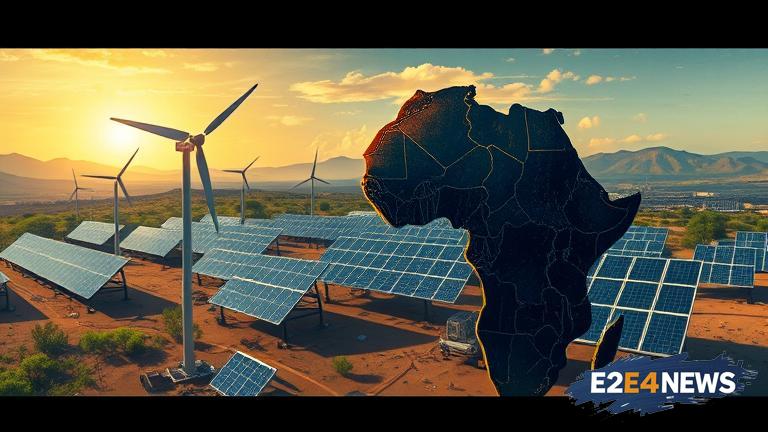The African continent is witnessing a significant shift towards renewable energy, driven by the need to address the pressing issues of energy access, climate change, and sustainable development. With many countries still struggling to provide reliable and affordable electricity to their citizens, renewable energy has emerged as a viable solution. Solar and wind power, in particular, have become increasingly popular, with many African nations investing heavily in these technologies. For instance, South Africa has set ambitious targets to increase its renewable energy capacity, aiming to generate 20% of its electricity from solar and wind power by 2030. Similarly, Morocco has made significant strides in developing its renewable energy sector, with a focus on solar power. The country’s Noor-Ouarzazate solar complex, one of the largest in the world, is a testament to its commitment to renewable energy. Other African countries, such as Egypt, Kenya, and Ghana, are also making notable progress in this area. The adoption of renewable energy is not only helping to reduce Africa’s dependence on fossil fuels but also creating new economic opportunities and jobs. Moreover, it is enabling the continent to mitigate the impacts of climate change, which is essential for achieving sustainable development. The African Union’s Agenda 2063, which aims to promote sustainable development and economic growth, recognizes the importance of renewable energy in achieving these goals. Furthermore, the United Nations’ Sustainable Development Goals (SDGs) also emphasize the need for increased investment in renewable energy to ensure universal access to affordable and clean energy. Despite the progress made, there are still significant challenges to be addressed, including the high upfront costs of renewable energy technologies and the need for greater investment in energy infrastructure. However, with the cost of renewable energy technologies decreasing over time, and with the support of international organizations and governments, Africa is well on its way to becoming a leader in the global renewable energy market. The benefits of renewable energy are numerous, ranging from reduced greenhouse gas emissions to improved air quality and enhanced energy security. Additionally, renewable energy can help to promote economic development, create jobs, and stimulate local economies. In fact, a study by the International Renewable Energy Agency (IRENA) found that the renewable energy sector could support up to 24 million jobs globally by 2030. As the demand for energy continues to grow in Africa, it is essential that the continent prioritizes the development of renewable energy sources. This will not only help to ensure a sustainable energy future but also contribute to the achievement of the SDGs and the African Union’s Agenda 2063. In conclusion, Africa’s renewable energy revolution is gaining momentum, driven by the need to address the pressing issues of energy access, climate change, and sustainable development. With the support of international organizations, governments, and the private sector, the continent is well on its way to becoming a leader in the global renewable energy market, promoting sustainable development, and ensuring a bright future for its citizens. The future of renewable energy in Africa looks promising, with many opportunities for growth and development. As the continent continues to transition towards a low-carbon economy, it is essential that renewable energy remains at the forefront of the agenda. By doing so, Africa can ensure a sustainable energy future, promote economic development, and contribute to the achievement of the SDGs. The time to act is now, and with the right policies, investments, and partnerships in place, Africa can unlock its full potential and become a global leader in the renewable energy sector.
